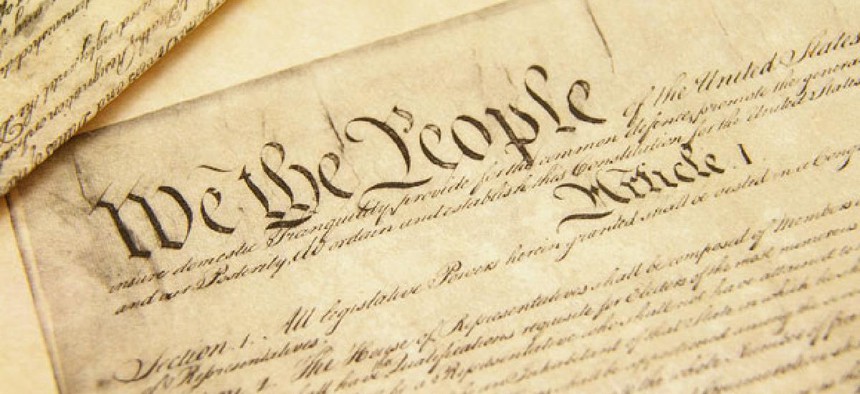When We the People talk it’s not always pretty

zimmytws/Shutterstock.com
Experts respond to secession petitions.
The flood of petitions advocating secession that flowed into the White House after President Obama’s November reelection were not the most constructive use of the administration’s public engagement website We the People.
Directly engaging the public, however, is a messy business that requires dealing with a lot of loud people so a few softer voices that might not otherwise be heard can break through, digital democracy advocate J.H. Snider said Monday.
Petitioners from all 50 states sought to secede from the union in the wake of President Obama’s reelection victory. The White House responded to nine of those petitions that crossed the 25,000 signature threshold for an official reply on Friday.
Snider is president of the digital democracy project iSolon.org and a fellow at Harvard University’s Edmond J. Safra Center for Ethics. He compared the secession petitions to the often outlandish questions politicians take on TV and radio call-in programs or at town hall meetings.
“Petitions are a type of democratic research and development,” Snider said. “Like R and D investments, few petitions will pan out, and it may take many years for the payoff. Despite the short term cost and hassles, they are worth it. They strengthen democracy.”
We the People’s principal value for Snider is less about how the administration responds to petitions but that the site becomes a tool for advocates of low-visibility issues to begin rallying public support.
He described the site as having great promise soon after it launched in September 2011 but said he’s been less impressed by the way it’s developed since then.
He criticized the site Monday for promoting “featured responses” about issues that are administration priorities such as reducing gun violence and reforming immigration rather than issues that might not otherwise garner public attention.
He also argued the White House should give petition writers access to the email addresses of signatories to use as an organizing tool. The White House has declined to do that out of privacy concerns.
Harvard Professor Archon Fung agrees with Snider that We the People’s best use is to unearth issues that wouldn’t normally get a hearing on Capitol Hill. He describes the site as just as much a barometer as an organizing tool, though.
“For me, it’s most interesting as an early detection system for new issues that are out there or old issues that are being treated in new ways,” he said. “I guess secession is kind of like that. People talk about states’ rights but secession is a more radical version of that for sure.”
Fung’s research focuses on democracy and citizenship. Rather than simply respond to the petitions, he suggested, the White House should have reached out to some of the organizers to learn more about their concerns.
The secession petitions in aggregate received more than a million individual signatures, though many people signed numerous petitions. One petition from Texas received 125,000 signatures, making it one of the most popular petitions posted to We the People thus far.
“As a matter of political preference, I don’t think secession is a reasonable policy alternative,” Fung said, “but [the secession petitions] did get a lot of signatures. That’s not many people as a percentage of the American population, but a lot relative to the site. So I would have preferred there to be some next step in the conversation.”
Administration officials responded to one We the People petition on improving oversight of commercial dog breeders with a new proposed regulation. Otherwise the site has produced few major policy changes.
(Image via zimmytws / Shutterstock.com)






